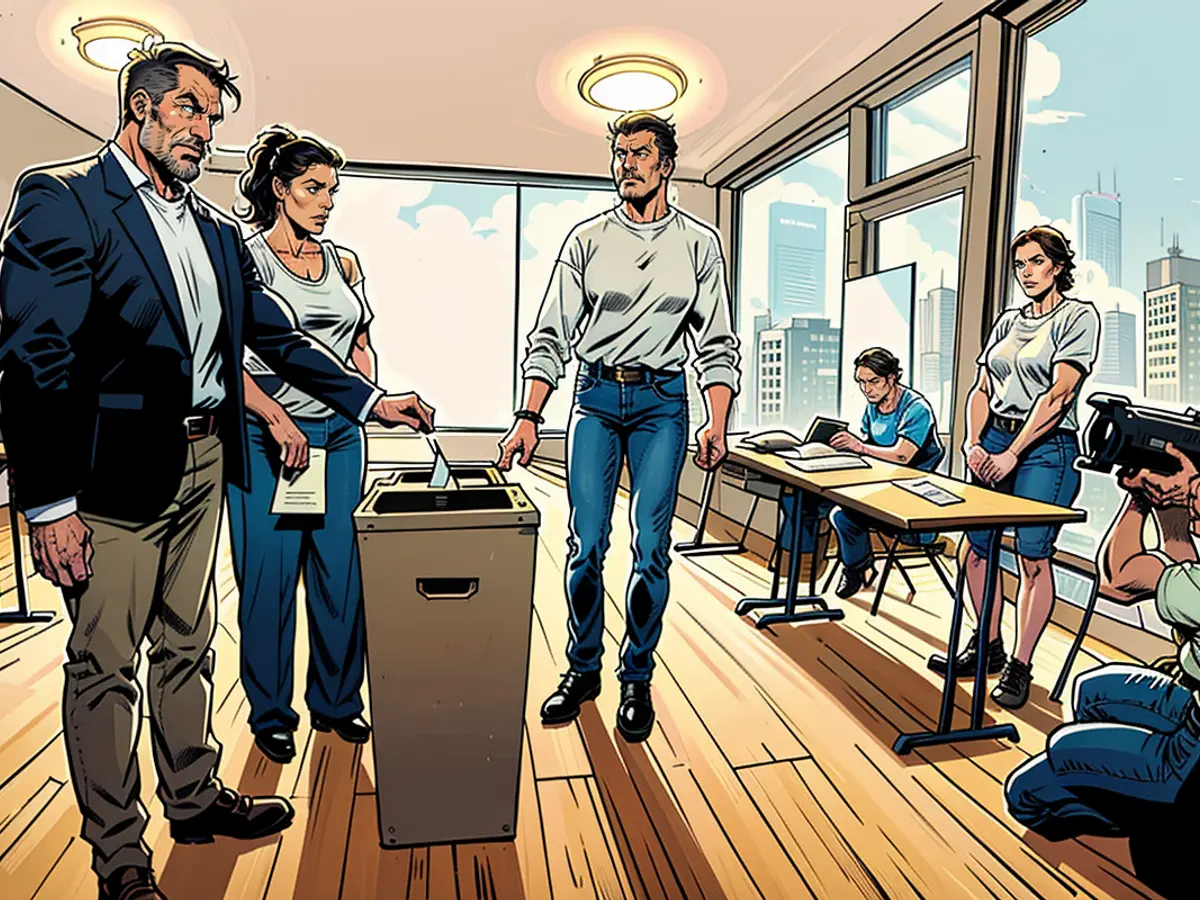With 23 minutes remaining, direct orders issued in Saxony are still leading the way in the Landtag.
The Left Secures Two Direct Seats in Leipzig and Gains a Parliament Position Thanks to Saxon Electoral System Quirks, Despite Failing to Clear the 5% Threshold in Projections. This Results in the Kenya Coalition of CDU, Greens, and SPD Losing Its Majority.
22:54 Green Party Head Nouripour: Migration and Ukraine Key Decisive FactorsGreen Party head Omid Nouripour attributes the results of the Saxony and Thuringia state elections primarily to the issues of migration and Ukraine. "It's clear that migration and the peace in Ukraine question played a significant role in the final stages," Nouripour told Phoenix TV. While the federal government is addressing these issues, "we're at a disadvantage because this coalition delivers but also undermines itself by bickering unnecessarily on the public stage."
22:39 Thuringia: Current Coalition of CDU, BSW, and SPD Lacks MajorityIn Thuringia, the previous red-red-green minority coalition under Minister President Ramelow has been voted out. Since no party is willing to coalition with the AfD, the most likely option for a government coalition is an unprecedented alliance of CDU, BSW, and SPD. However, according to current projections, this combination is short of a seat needed for a majority in the state parliament. Such an alliance would also rely on The Left.
22:24 CDU's Top Candidate Voigt Misses Direct Seat in ThuringiaCDU's top candidate Mario Voigt missed the direct seat in his constituency in Thuringia. He received 37.4% of the first votes in Saale-Holzland District II, trailing AfD candidate Wiebke Muhsal, who received 39.2% of the votes. In the 2019 state election, Voigt was elected to the state parliament as a direct candidate.
22:07 Thuringia: Many Young Voters Opt for AfDMore than a third of young voters in Thuringia chose the AfD, a right-wing extremist party as classified by the domestic intelligence agency. According to a survey conducted by infratest dimap for ARD, 38% of 18-24 year-olds in Thuringia voted for the AfD. The Left received 16%, the CDU 13%, and the Greens performed worst among young voters, with only 6% of the votes.
21:39 Kretschmer Wins Direct Seat in SaxonySaxony's Minister President Michael Kretschmer won the direct seat in his constituency of Görlitz II with 47.2% of the votes, leading the AfD candidate, who received 39.4%. Kretschmer's party performed worse in his constituency, with 34.2% of the votes, trailing the AfD, which received 37.3%.
21:32 Current Projections for Saxony: CDU Clearly Ahead of AfDIn Saxony, the CDU is now clearly ahead of the AfD in both ARD and ZDF's projections. Infratest Dimap (ARD) and the Research Group Wahlen (ZDF) both consistently show the CDU about one percentage point ahead. The CDU is thus projected to get 31.5 to 31.8 percent, while the AfD is expected to receive 30.4 to 30.8 percent. Initially, the Research Group Wahlen had seen a neck-and-neck race between the CDU and AfD in their projection, but the AfD kept narrowing the gap. In the ARD projection, however, the CDU maintained a clear lead throughout.
21:21 Thuringia: Ramelow's "Heart's Desire" Likely UnfulfilledThe Left party has suffered heavy losses in the Thuringia state elections, and Minister President Bodo Ramelow will likely have to step down. One of Ramelow's "heart's desires" for the evening—that the AfD would not get at least one-third of all votes—seems unlikely to come true. The AfD appears to have achieved this, potentially blocking decisions that require a two-thirds majority.

21:13 SPD in Single Digits, but Klingbeil Stands by ScholzDespite the poor results of the SPD in the Thuringia and Saxony state elections, party leader Lars Klingbeil has reaffirmed his support for Federal Chancellor Olaf Scholz. In an interview with ZDF, Klingbeil stated that the SPD would continue to back Scholz and that all party members must now work even harder to win back voters.
21:02 FDP Deputy Chairman Kubicki: "Traffic Light Coalition Has Lost Its Legitimacy"Following the poor results of the traffic light coalition parties in the Saxony and Thuringia elections, FDP deputy chairman Wolfgang Kubicki has called for consequences at the federal level. "The election results show: The traffic light coalition has lost its legitimacy," Kubicki wrote on "X". If a significant portion of voters reject the coalition in this way, it must have consequences. The people have the impression that "this coalition is harming the country". The FDP has failed to clear the 5% hurdle in both state elections and is currently projected to be just 1% away.
20:41 Thuringia: Höcke Misses Direct SeatThe AfD's faction leader, Björn Höcke, has missed out on a direct seat in the Thuringia state parliament. According to ntv information, the AfD will secure Höcke's seat in the state parliament by having another AfD MP resign in his favor.
20:37 Saxony: The Left Party edges closer to state parliament despite a 4% decrease despite a substantial drop, the Left Party is inching closer to securing a spot in the Saxony state parliament. Although they fell short of the 5% threshold with second votes, they're estimated to reach 4.3% in ZDF's highest prediction. In Leipzig districts, two Left Party direct candidates are leading comfortably, potentially clinching two direct mandates. This would ensure a few seats in the new state parliament for the Left Party. These two candidate victories could also place them first on their party's state list, potentially denying the current CDU, SPD, and Green coalition a majority. Minister-President Kretschmer would then need the BSW for a governing majority.
20:28 Thuringia: The AfD keeps climbing in ZDF's high estimate In ZDF's latest high estimate for Thuringia's election results, the AfD is continuing its upward trend. They're predicted to earn 33.4% of the votes. The CDU is at 23.8%, the SWB at 15.5%, and the Left Party at 11.9%. The SPD is at 6.0%, and the Greens at 3.4%. The FDP is not expected to surpass 1.2%.
20:17 Thuringia and Saxony: CDU's lead over AfD is minuscule in ZDF's high estimate According to ZDF's high estimate, the CDU in Saxony only leads the AfD by 0.1%. The Christian Democrats hold 31.5% of the votes, while the AfD, identified as right-wing extremist by the domestic intelligence agency, has 31.4%. In Thuringia, the AfD has reportedly pulled ahead of the CDU in ZDF's high estimates. The Greens are currently at 5.1% in Saxony and are at risk of losing their parliamentary seats. The Left Party has little chance with a projected 4.3%. The SPD is secure in the state parliament with 7.6%.
19:56 Thuringia: Höcke's direct parliament seat in peril The possibility of AfD faction leader Björn Höcke securing a direct parliament seat in Thuringia is at risk. With 68 of 74 electoral districts counted, Christian Tischner of the CDU is leading with 42.3% of the votes, just ahead of Höcke with 40.4%. If Tischner wins the majority of votes in the Greiz II electoral district, Höcke won't secure a direct mandate. He would then rely on a seat in parliament via the state list, if any seats remain available. However, if several AfD candidates are successful as direct candidates, it's unlikely any candidate will get a seat via the state list.

19:50 Höcke on the AfD's success: "The exclusion policy has failed" The AfD is projected to be the largest party in Thuringia's state election. Höcke, the AfD's top candidate, labeled the election result as a "historic outcome." He discussed the upcoming government formation in an interview with ntv.
19:42 Ramelow on the Left Party's decline: "We've been pushed into a corner" Thuringia's Minister-President Bodo Ramelow attributed the Left Party's decline to two main factors: "First, a CDU that has continually associated the AfD and the Left Party, pushing 'exclusionism' in our direction, despite sharing power with them for five years." The other reason, said Ramelow, was the BSW party's misguided claim to take 17% of the votes away from the AfD, which instead took votes from the Left Party. Despite this, Ramelow celebrated the high voter turnout.
19:26 Nouripour on the AfD's success: "I have concerns for those who are afraid" The AfD is predicted to surpass 30% in both Saxony and Thuringia's state elections, leaving the traffic light parties far behind. Green Party leader Omid Nouripour views the AfD's election results as a "turning point" and a call to defend democracy together.
19:13 Latest projection for Saxony: CDU's victory draw closer The latest ZDF projection indicates the CDU's victory is becoming more likely: The Christian Democrats are now ahead by 0.3% with 31.7%, very close to the AfD with 31.4% of the votes cast. The BSW comes in at 11.4%, the SPD at 7.8%, the Greens are more securely in the state parliament with 5.5%, while the Left Party still doesn't meet the 5% hurdle with 4.3%.
20:08 Wagenknecht seeks alliance with CDU and possibly SPD in ThuringiaThe leader of the Left Party in Thuringia, Sahra Wagenknecht, aims to form a coalition with the CDU and potentially the SPD. Wagenknecht expressed hope in a ARD interview that they could establish a stable government with the CDU, possibly also including the SPD, stating, "We very much hope that we will be able to form a good government together with the CDU - probably also with the SPD." The people of Thuringia desired a majority government capable of handling pressing issues such as the "massive teaching shortages" in the state, according to Wagenknecht. Moreover, the people sought a government that would "make its voice heard in national politics," one that would advocate for peace, diplomacy, and oppose the deployment of US missiles in Germany. Wagenknecht ruled out coalitions with the AfD for Thuringia.
20:02 New ZDF forecast for Thuringia: AfD sees boost in votesA ZDF projection of the election result in Thuringia suggests that the AfD is performing better than initial predictions. The right-wing extremists are projected to receive 33.1% of the votes, while the CDU receives 24.3%, and Wagenknecht's alliance garners 15%. The Left Party, currently the party in power, is projected to lose almost 8 percentage points and receive 11.7%. The SPD receives 6.6%, and the Greens receive 4%.
20:00 Goring-Eckardt on AfD's success: "Democratic shock" in GermanyGreen Party politician Katrin Goring-Eckardt refers to the AfD's success in Thuringia as a "democratic shock" for Germany. The defeat of the Green Party in the Thuringia state elections appears to have caused less concern for Goring-Eckardt than the AfD's emphatic victory. Green Party leader Omid Nouripour admits to feeling only "marginal pain" at his party's defeat in light of the AfD's rise as the strongest force in a state parliament.

19:56 Kretschmer on Saxony: "We're reason to celebrate"Saxon Minister-President Michael Kretschmer regards the CDU as a stable foundation for the coalition government. "We have every reason to celebrate," said Kretschmer at the CDU election event. "We've faced five challenging years," during which the people of Saxony trusted the CDU, and the voters did not resort to a protest vote. "We understand how disappointed the people are with the state of affairs in Berlin."
19:48 Initial result for Saxony: CDU's lead over AfD narrowsAccording to ZDF's initial projections, the CDU's lead over the AfD in the Saxony state election has narrowed: The CDU now leads narrowly over the AfD with 31.9% to 31.3% of the votes cast. The BSW receives 11.6%, the SPD receives 7.8%, and the Greens barely make it into the state parliament with 5.2%, while the Left falls just short with 4.5%.
19:43 Weidel on Thuringia and Saxony: Government participation for AfDAfD federal party chair Alice Weidel claims the AfD's right to participate in government in Thuringia and Saxony. "Under typical circumstances in this country," states Weidel in a ARD interview, "the strongest party - which is the AfD - would explore possibilities." The voters in Thuringia demand the AfD's involvement in the government, according to Weidel, as the AfD captures 30% of the votes in both federal states, potentially impeding the formation of a stable government without their involvement.
19:40 Kuhnert on Thuringia and Saxony: "Real risk of being kicked out of the state parliament"SPD General Secretary Kevin Kuhnert acknowledges the party's modest results in the Thuringia and Saxony elections. "This is not a reason to celebrate for the SPD," said Kuhnert on ARD. The SPD has struggled for years, facing the real risk of being eliminated from the state parliaments. "There was a genuine threat of being ejected from the state parliaments," mentioned Kuhnert, emphasizing the need for change and increased communication with voters. When asked about Chancellor Olaf Scholz, Kuhnert stated, "We need to explain our politics jointly."
18:17 CDU Party Leader: No Alliance with AfDCDU Party Leader Carsten Linnemann has declared that there will be no collaborations with the AfD in Thuringia or Saxony. He asserted this during an interview with ARD, emphasizing their firm stance on the matter. The CDU will form governments from the middle of the parliament, exhibiting confidence in its ability to succeed. As the last surviving people's party, the CDU serves as a "barrier," Linnemann said, hinting that the traffic light parties have faced penalties.
18:13 Saxony Election Results Projection: CDU Slimly Leads AfD, BSW at 12%The initial Saxony state election results projection reveals the CDU with 31.5% of the vote, narrowly surpassing the AfD with 30%. The BSW is the third most powerful force with 12%, while the SPD continues to hold a seat in the state parliament with 8.5%. The Greens are just managing to stay afloat with 5.5%, with The Left falling below the 4% threshold and the FDP failing to secure a place in the new parliament.
18:10 Thuringia Election Results Projection: AfD in Lead, BSW Hits Double DigitsThe Thuringia state election projection indicates a clear lead for the AfD with 30.5% of the vote, closely followed by the CDU with 24.5%. The Left and SPD also retain their seats in the state parliament with 12.5% and 7% respectively. The BSW clinches a place in the state parliament with 16%. However, the Greens and FDP fail to reach more than 5%.

18:01 AfD Triumphs in Thuringia, BSW Shines in SaxonyAccording to the first projection following the Thuringia state election, the AfD emerges as the dominant force. The SPD just manages to cross the 5% threshold, while the Greens and FDP fall short. In contrast, the BSW achieves a double-digit score for the first time in Saxony, with the CDU narrowly ahead of the AfD. The Left and FDP would not secure representation in the state parliament as per the projection, however, the Greens continue to remain.
17:18 Höcke at Risk of Missing State Parliament in ThuringiaAfD faction leader Björn Höcke in Thuringia is at risk of not securing a seat in the future state parliament. His successful party colleagues may jeopardize his chances. Many AfD candidates in the constituencies boast strong prospects of directly winning a seat. Unfortunately, Höcke faces intense competition from CDU candidate Christian Tischner in his constituency of Greiz II. If Tischner secures victory and the AfD wins more direct mandates than entitled by the second vote result, no one can enter through the state list, not even the first-place holder – Höcke. In this situation, the AfD may try to persuade a successful direct candidate to relinquish their seat in the state parliament, allowing Höcke to secure his mandate.
16:48 AfD Thuringia Party Likely to Evade Media CoverageThere's a strong possibility that the AfD's Thuringia election party will not receive coverage from mainstream media. The party, classified as right-wing extremist by the domestic intelligence agency, attempted to block several media outlets from the event. However, a court stepped in, prohibiting the exclusion of the media, leading the state party to reject all press access. A party spokesperson cited organizational issues, stating that there wasn't enough space at the venue for all the media representatives who had applied for accreditation.
16:29 Approximately a Quarter Voted by Mail in SaxonyFor the "crucial" Saxony election as designated by CDU Minister-President Michael Kretschmer, around 25% of eligible voters have already cast their ballots by mail by late afternoon. The state election commissioner anticipates 24.6% of voters will have voted by mail. The voter turnout remains slightly higher than 2019's figures.
15:52 Höcke Casts Vote in Lada, Ramelow Votes with WifeThuringia's AfD state chairman and top candidate, Björn Höcke, cast his vote in the morning. Höcke arrived at his polling station in Bornhagen, Eichsfeld district, in a Lada Niva, a Russian-made off-road vehicle. In contrast, Minister-President Bodo Ramelow voted in the state capital of Erfurt, accompanying his wife, Germana Alberti vom Hofe. Ramelow, 68, has been in office since 2014, most recently leading a minority coalition.
15:40 Higher Voter Turnout than Previous ElectionIn Thuringia, 44.4% of voters had cast their ballots by 2:00 PM, marking an increase of over two points compared to the last election five years ago. The state election commissioner projects a high turnout, not accounting for mail-in voters. In Saxony, the turnout too was slightly higher than 2019, standing at 35.4%, but only marginally so. However, the election commissioner anticipates significantly more mail-in voters than in 2019. Polling stations in both states will close at 6:00 PM.
15:13 Kretschmer Hopes Coalition Parties Make It into State Parliament

14:40 Key Concerns Driving Voter Decisions in Saxony and ThuringiaA large survey reveals that nearly one-third of voters in Saxony and Thuringia plan to vote for the AfD in the September 1sts elections. The survey highlights the primary concerns and issues fueling this trend, with migration being just one of them.
14:13 Höcke departs polling station swiftlyBjörn Höcke, the AfD's top candidate in Thuringia's state election, voted around midday at the Bornhagen polling station. He didn't stick around for long and avoided chatting with journalists on site. In his past elections, Höcke consistently lost to the CDU candidate in Eichsfeld, so this time he chose to compete in the Greiz constituency. Regardless, a defeat against the CDU still seems likely for him.
13:50 Voter turnout in Thuringia comparable to 2019 by noonVoter turnout in Thuringia, as of noon, appears to be roughly equal to the turnout at the previous parliamentary election. Around 32% of eligible voters had cast their votes in polling stations by 12 pm, according to the state election commissioner. It's worth noting that postal voters aren't included in these numbers. In 2019, the turnout was also 31.2% at this time. Additionally, there seems to be a higher interest in this state election compared to the European and local elections held earlier this year, with a turnout of 24.3% at the same time in June.
13:29 High voter turnout projected in SaxonyA high voter turnout is forecasted for Saxony's state election, with 25.8% of eligible voters having cast their votes by midday, as reported by the Statistical State Office in Kamenz. At the same time in the 2019 state election, the turnout was 26.2%. It's important to mention that postal votes are not yet included in these figures. An estimated 24.6% of eligible voters are anticipated to vote by post, contrasting with 16.9% in the 2019 election. The state election authorities have reported no disruptions as of yet.
13:11 von Lucke: Result could be detrimental to Berlin coalitionThe results of the state elections in Saxony and Thuringia have yet to be determined. Political scientist Albrecht von Lucke told ntv that if the SPD does not secure a place in the state parliament, it would almost be an unprecedented event. He touches upon the election's impact and future implications in his interview.
12:44 Police investigating threat at polling station in GeraPolice in Gera are investigating a threat at a polling station. On arriving at the polling station to vote in the morning, a man donning an AfD T-shirt was requested by the polling station manager to remove the shirt, as party advertising is prohibited in polling stations. Although he obliged, the man uttered threats as he left the polling station grounds. Police have taken a statement and advised the man on the severity of his actions. Separately, the police in Erfurt are investigating cases of criminal defacement involving the graffiti "Höcke is a Nazi" near polling stations.
12:15 Correctiv warns against circulating false informationCorrectiv, a research network, has issued a warning about a frequently shared misconception that signatures on ballot papers prevent vote manipulation. Confirming this misinformation, the Federal Returning Officer's office told Correctiv that "ballot papers must not be signed. Signing the ballot paper by the voter jeopardizes the secrecy of the vote, rendering the entire ballot paper invalid."

11:51 Voigt hopes for "stability in majority ratios"Thuringia's CDU top candidate, Mario Voigt, has also cast his vote. After voting in Jena, Voigt expressed his hope that "many Thuringians will head to the polls and exercise their right to shape the future of our state." He also wishes for "stability in majority ratios" to ensure the state can progress again.
11:25 Sonneberg Witnesses Surge in Far-Right AggressionsSonneberg is now led by an AfD politician. Since then, several individuals have reported feeling intimidated, resulting in many leaving their jobs. Moreover, there appears to be a significant increase in far-right attacks, with reports suggesting a fivefold increase within a year. Experts attribute this surge to the AfD district administrator.
10:57 Kretschmer's Remarks at the Polling StationSaxony's Minister-President Michael Kretschmer considers the state election in his federal state as "probably the most significant election in the past 34 years." After casting his vote in Dresden, he expressed gratitude to those who, in recent years, "voted differently" but have now chosen the "majority power in the bourgeois center," specifically referring to the Saxon Union. Kretschmer believes this mutual understanding will give rise to a government that would serve this land. In polls, his CDU is currently contending against the AfD.
09:59 "Historically Insensitive": Historian Slams Election DateHistorian Peter Oliver Loew blasts the election date for the regional elections in Saxony and Thuringia on the 85th anniversary of Germany invading Poland in 1939. "Anyone who thought it was a smart move to hold elections on September 1st clearly lacks historical sensitivity," the head of the German Institute for Polish Affairs told RND. He also mentioned the far-right AfD, labeled as "firmly right-wing extremist" by the domestic intelligence service in both states, stating, "This could result in unwanted connotations if a party with unclear ties to Nazi era victories in Dresden and Erfurt."
09:30 "Pivotal Election": All Statistics for the Saxony State ElectionApproximately 3.3 million eligible voters in Saxony have the opportunity today to pick the party that will steer the state's political direction in the Dresden parliament. The CDU could lose its position as the ruling party in the state for the first time since 1990. Saxony's Prime Minister Michael Kretschmer named it a "pivotal election." "Everything is at stake."
09:05 Kretschmer Accused of "Election-Time Disturbance" by Traffic Light CoalitionToday is election day in Saxony, and the question remains: Will Michael Kretschmer maintain the CDU's winning streak in the state? In a ntv interview, he discusses his position on the refugee debate, the traffic light government, and the Ukraine war.
08:46 Thuringia Election DataVoting day has arrived: At the heart of Germany, the question centers on who will control the state with its nearly 2.1 million residents for the following 5 years. Will the AfD, led by top candidate Björn Höcke, emerge as the strongest party in Thuringia?

08:24 How the AfD Could Threaten DemocracyPolls indicate that the AfD is likely to significantly increase its influence in the upcoming elections in Saxony and Thuringia. For democratic institutions, this is potentially perilous, as a research group has warned. Since the rule of law may not be as strong as many believe.
08:00 Polling stations in Thuringia and Saxony open
Voting for new regional parliaments is underway today in Thuringia and Saxony. According to polls, the AfD is dominating in Thuringia. In Saxony, the CDU led by incumbent Prime Minister Michael Kretschmer and the AfD are neck and neck. Initial predictions are expected around 18:00 when the polling stations close. These elections in the two eastern German states also serve as a litmus test for the traffic light coalition in Berlin.
For the current Thuringian government, a red-red-green coalition led by Prime Minister Bodo Ramelow (Left), there is no majority in the polls. A potential post-election arrangement could consist of the CDU, the Sahra Wagenknecht Alliance (BSW), and the SPD. In Saxony, it is uncertain whether the current coalition of CDU, SPD, and Greens still holds a majority. Kretschmer does not rule out an alliance with the BSW. The Left party faces the risk of being expelled from the Saxony parliament. The same threat hangs over the Greens and FDP in Thuringia.
In the context of the given text, here are two sentences that contain the word 'The AfD':
- Due to the strong performance of 'The AfD' in the elections, the coalition of CDU, BSW, and SPD in Thuringia is projected to be short of a majority, making an unprecedented alliance with 'The AfD' a possible option for a government coalition.
- Despite the Left Securing Two Direct Seats in Leipzig and Gaining a Parliament Position Thanks to Saxon Electoral System Quirks, The AfD still managed to claim significant votes and gained momentum, potentially posing challenges for the forming coalitions in Saxony.









